On Saturday, September 21, while much of the island was still recovering from Hurricane Humberto, a group of 25 people, including 20 BIOS staff, interns, and fall semester students, joined the annual EY Bermuda Coastal Clean-up. The annual event, held in support of Keep Bermuda Beautiful, is timed to coincide with the Ocean Conservancy’s International Coastal Cleanup, which is the largest single-day ocean clean-up event in the world.
Enhancing Workforce Capacity
October 28, 2019
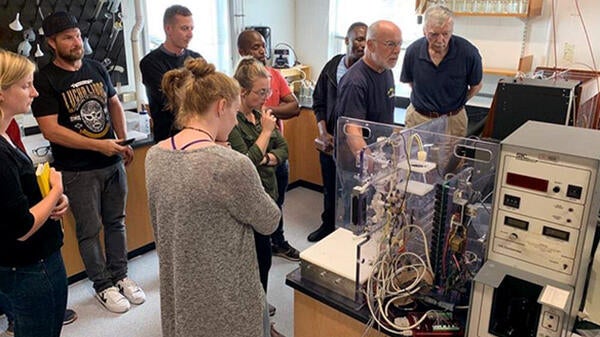
From September 23 through 27, Professor Nicholas Bates, senior scientist at BIOS and Dr. Ludger Mintrop, owner of Marianda—a company in Kiel, Germany that specializes in instruments for marine chemistry analysis—co-hosted a first-of-its-kind professional development course in Bermuda.
In Search of Storms
October 28, 2019
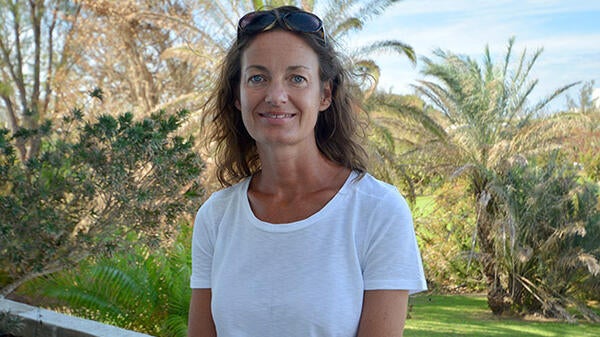
Samantha Hallam, a doctoral student at the University of Southampton National Oceanography Centre in the United Kingdom, has been fascinated by storms since she spent time sailing dinghies as a little girl in her hometown of Hampshire, England. This interest in “storminess,” as she puts it, drove her education, beginning with an undergraduate degree in environmental science from the University of East Anglia in 1990. This was followed by a master’s degree in ocean science from the University of Southampton in 2014, where her thesis research was on ocean influences on the North Atlantic jet stream – a narrow band of fast-moving wind that plays a large role in weather across western Europe.
Oceanographic Experience Across the Pond
October 28, 2019
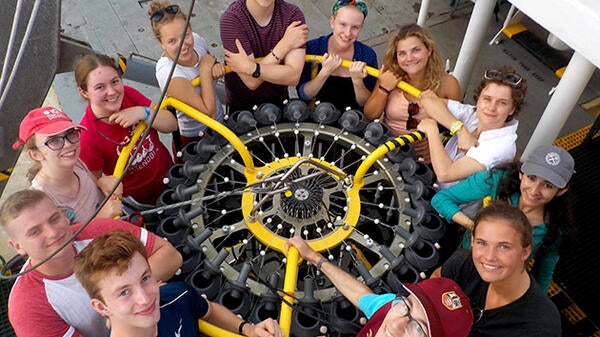
For the last nine years, students in the Earth Science program at the University of Oxford in England have visited BIOS to gain first-hand knowledge of coastal and deep-water oceanography, as well as the unique geology of Bermuda.
Hands-on with Hurricanes
November 25, 2019
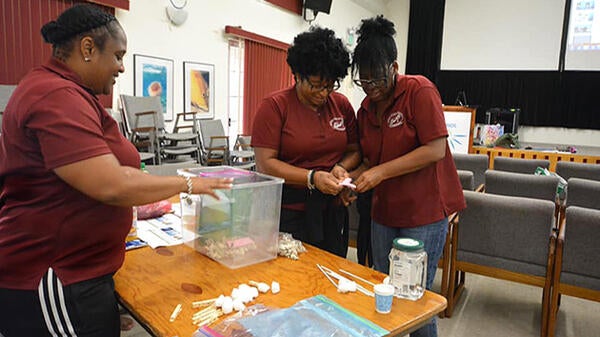
On the first day of the Bermuda half-term school holiday—Monday, October 21, 2019—18 teachers attended a workshop at BIOS entitled “Hurricanes: Data in the Classroom.” The workshop was offered as part of the BIOS Curriculum Enrichment Program, which offers educational support and resources to students and teachers, in an effort to boost the availability of science, technology, engineering, and mathematics (STEM) learning experiences in Bermuda. Through a partnership with the Bermuda Union of Teachers, the Curriculum Enrichment Program allows BIOS scientists and educators to share aspects of BIOS’s research for classroom lessons.
A Lifelong Passion for Science
November 25, 2019
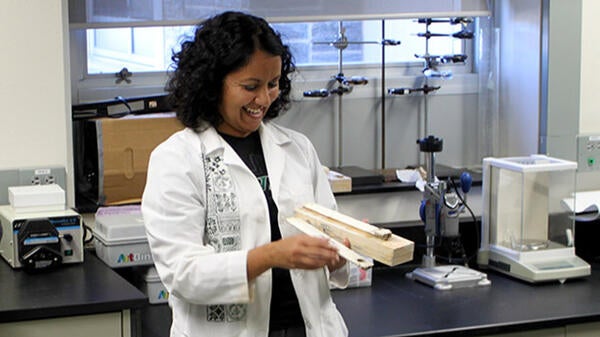
In the summer of 1999, in the middle of working toward her master’s degree in zoology at the University of Toronto, Lisa Rodrigues—then 21—returned home to Bermuda. Having heard about BIOS from her advisor, and with an interest in focusing on the island’s marine organisms for her thesis, she applied to and was accepted into the Bermuda Program. Now, as then, the Bermuda Program offers intensive, hands-on summer internships in marine and atmospheric sciences to Bermudian students ages 18 and older.
Don’t Let Their Size Fool You
November 25, 2019
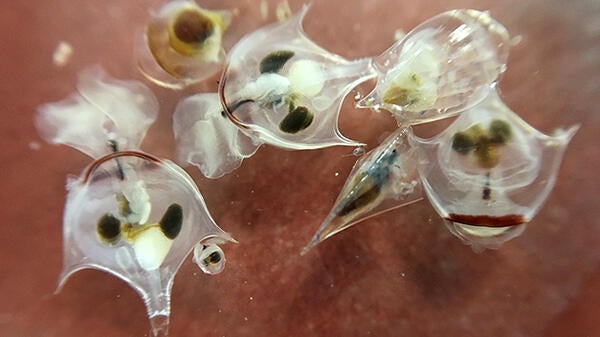
For nearly a hundred years, scientists have known that plankton—the microscopic organisms that drift and float in the ocean, also known as marine microbes—form the basis of the ocean’s food web. Phytoplankton (literally “plant wanderers”) are photosynthetic, like their terrestrial counterparts, and convert sunlight into energy. Phytoplankton, in turn, are consumed by zooplankton (literally “animal wanderers”), as well as a host of larger marine organisms, including juvenile fish, shellfish, birds, and even whales. However, scientists are now learning that plankton play an even larger role in earth’s complex biogeochemical systems.
Medicine, Ocean Science, and Pharmaceuticals
November 25, 2019
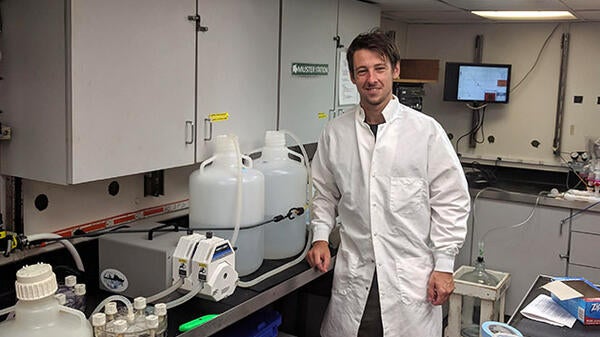
When David Picton first arrived at BIOS in 2013 as a work study intern, he had no intention of pursuing a career in research science, wanting—instead—to become a medical doctor. At 19 he had just finished his first year of studies in biomedical sciences at Newcastle University in the United Kingdom and was simply looking for an opportunity to travel and try his hand at something new, with the hopes of gaining a few skills in the process.
BIOS Offers K-12 Schools Abroad Unparalleled Opportunities
August 26, 2013
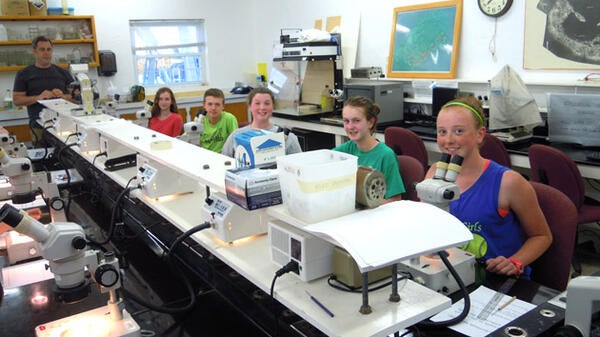
Although BIOS was originally founded as a research station for college and university students, over the years it has also become a place for middle and high school teachers to take their students for a trip abroad that combines hands-on education, adventure, and the experience of living on a working research station. Many of these teachers return year after year with new groups of students eager to learn about everything from history to marine biology to Bermuda’s native flora and fauna.
Princeton University Collaborates with BIOS to Teach Marine Biology
August 26, 2013
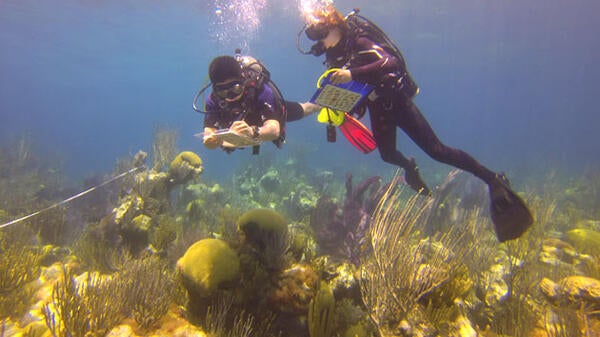
Each year, as part of the ongoing Princeton University-BIOS collaboration, a group of undergraduate students in Princeton’s Ecology and Evolutionary Biology (EEB) and Princeton Environmental Institute (PEI) programs visit BIOS for a month-long course in marine biology. Co-taught by Dr. James Gould (Princeton EEB) and Dr. Samantha de Putron (BIOS), the course is designed to cover all aspects of marine biology, with a special focus on coral reefs.
